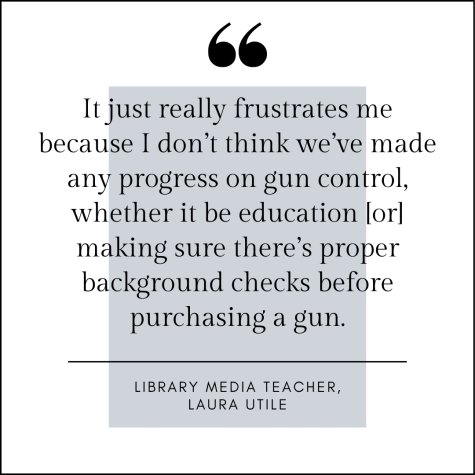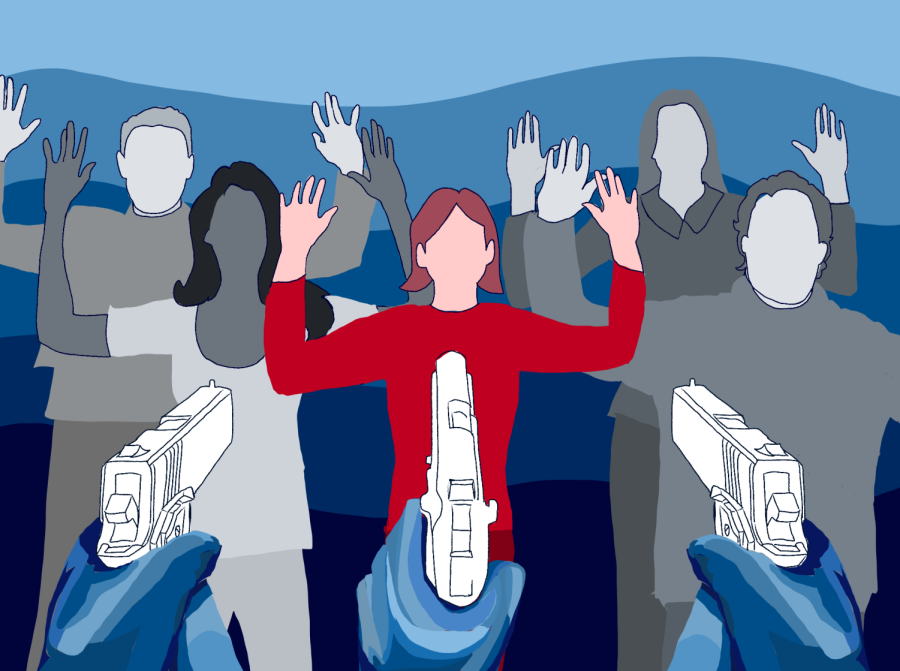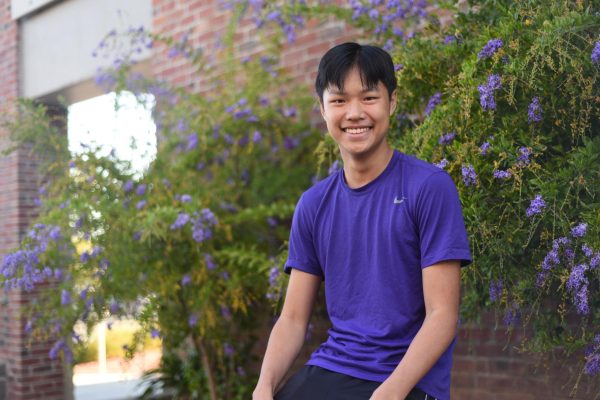A closer look at gun control
Staff and experts provide their opinions and perspectives on gun control
Laura Utile was caught in the middle of a robbery scene four years ago in the Tanforan Mall in San Bruno.
April 14, 2023
The gun store owner in this story is anonymous due to safety concerns and will be referred to as Source A.
Library Media Teacher Laura Utile was held at gunpoint four years ago at the Tanforan Mall in San Bruno, California. While shopping at a Sears store, she suddenly noticed children running past her in a frenzied panic. A few minutes later, police officers arrived with guns drawn, searching for the suspect of a potential jewelry store robbery. Utile recalls her anxiety as she reminded herself to breathe and keep her hands up, fearful that the cell phone clutched in her hands would be mistaken for a weapon by the officers.
“I knew it was a police officer, [but] it is still just a sick feeling to have a gun pointed on you,” Utile said. “[I didn’t] know if the kids running were part of what happened, or if they were just running because of the gunfire that [had] happened.”
Escorted to the basement of the Sears store and caught in the heat of the panic, Utile “didn’t really know what was going on.” Her jarring trip to the mall marked her most direct experience with gun violence, among other close incidents with school shootings that shaped her life and views on gun control.
While Utile has had a handful of experiences with guns, she first became aware of the consequences of gun violence in fifth grade when a classmate of hers began to behave “disruptively.” She later learned that he had lost a brother to an accidental shooting at home.
“[It] was my first initial learning about gun violence [and realizing] that [it] can happen whether it be a mass shooting or not,” Utile said. “[It was] when it first came into impact.”
Around that time, she also recalls hearing the news of the assassination attempt on former President Ronald Reagan and the unease surrounding weapons.
“Just watching the fear on our parents’ faces [that] this is happening again – they had been through John F. Kennedy being assassinated and many civil rights leaders that had been killed,” Utile said. “So [I] could see the impact [it had] on the adults around [me].”
Utile’s inflammatory experience at the mall, along with her scattered encounters with gun violence throughout her life, contributed to her pragmatic beliefs regarding gun control. Even though she would never personally own a gun, Utile believes people should be able to own firearms with some guidelines, such as federally mandated safety courses. To support her reasoning, Utile compares owning a firearm to other civil rights that could be potentially hazardous.
“I don’t think it’s any different than driving a car,” Utile said. “We’re expected to take courses before we’re able to get our driver’s license … and occasionally we have to go in and take an exam, whether it be the written exam or the behind-the-wheel test.”
However, as the U.S. faces an epidemic of mass shootings, suicides and homicides in major cities, the preference for stricter gun control laws is becoming increasingly mainstream. English teacher Derek Lu echoes this view, stating that only members of the military should have a gun and the “harms [of owning a weapon] seem to outweigh the benefits.” He fears that guns could be seized by children and accidentally, or even intentionally, be misused.
“There have been all these reports of accidental shootings because a toddler or a kid accidentally stumbles upon a supposedly locked deposit box or storage box for the gun,” Lu said. “That’s not even getting into how easy it is for kids to access their parents’ guns if they want to shoot up a school, for example.”
People closer to the gun economy, such as Source A, a gun dealer in Santa Clara County, counter Lu’s claims by saying many firearms owners do not fit this “careless gun owner” stereotype. He believes that guns are not dangerous unless used in the wrong way. As a father of two, he makes sure to keep both his personal and customer firearms locked and unloaded, storing the firearms and ammunition in separate places out of reach from his children.
“There’s no way [that] they can get access to any of my firearms,” he said. “That’s the first thing. Secondly, education — I educate my kids. If they see a gun, they leave the area, [and] tell me or mom.”
Utile agrees with the consequences of unsafely stored guns, adding that she would feel uncomfortable owning a gun. She expresses that even if she kept it safe, she would not want to be “held responsible” for someone using it in the wrong way.
In addition to safe storage, both Utile and Source A agree that increased funding for mental health, universal background checks and bans on assault-style weapons or high-capacity magazines should be implemented.
Opinions begin to diverge most sharply across the gun spectrum when actual legislation is being proposed in state and federal legislatures. According to a February 2023 Gallup poll, 63% of Americans are dissatisfied with the current state of gun laws in America, marking an increase of 7% over the past few years.

“It just really frustrates me because I don’t think we’ve made any progress on gun control, whether it be education [or] making sure there’s proper background checks before purchasing a gun,” Utile said.
Although Lu acknowledges his own lack of optimism towards passing legislation around this issue, he still urges his fellow citizens to engage in the process of fighting for stricter gun control statewide and nationally.
“I think [first] is to just be aware,” Lu said. “Be aware of where you are and what the gun laws are in that state. And [second], call your politicians. Make sure to keep pressure on them and remind them that just because we’re a blue state doesn’t mean we shouldn’t be proactive about fighting for stricter gun control in our own state and in other states.”
Some gun owners such as Source A support similar gun control laws, but their belief in their Second Amendment rights often tempers their willingness to meet strict gun control advocates such as Lu in the political center. Source A “supports gun control laws 100 percent,” but only “common sense gun control [laws].”
Both Utile and Lu attribute the lack of progress in the gun violence crisis to the mounting polarization of political parties in the United States, which makes it difficult for everyone to be on the same page. Four years after the incident at the mall, Utile is still not optimistic that those on the right and left of this issue will unite to create meaningful – and lasting – change.
“I wish I could be optimistic, but with the divide in the country, I think we need to come together more [often] and have more conversations,” Utile said. “That’s the best for the United States so that [gun violence] doesn’t continue to happen across the country.”



















